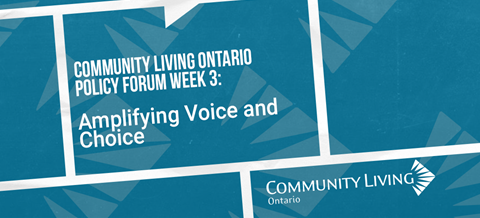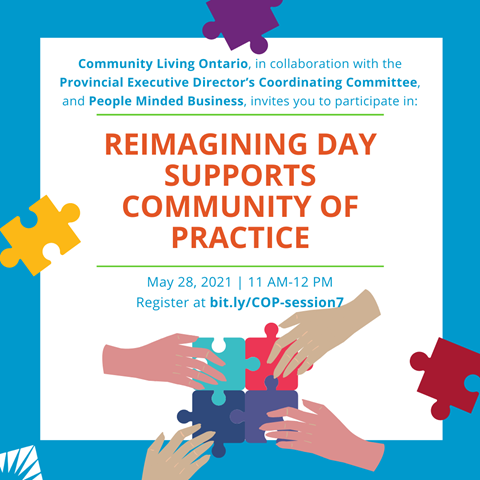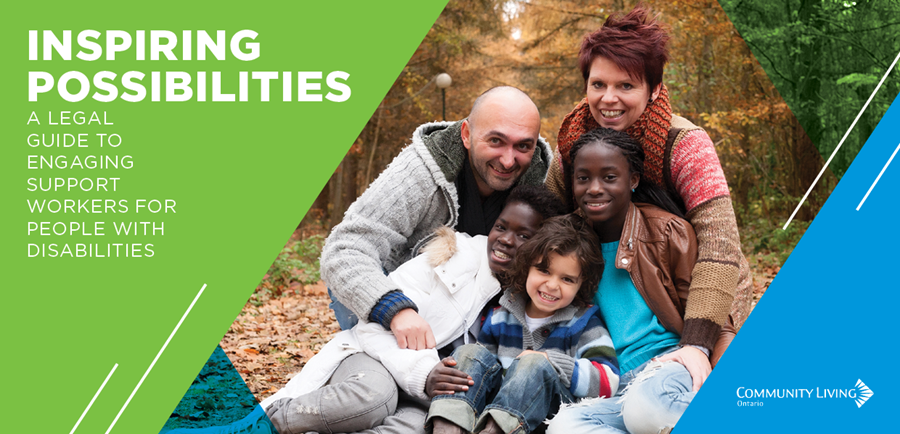
On May 18th, the Ministry of Children, Community and Social Services launched Journey to Belonging: Choice and Inclusion, in traditional and easy read formats. The document sets out a ten-year timeline for the reform of developmental services in the Ontario.
Journey to Belonging sets out a vision where “People with developmental disabilities are supported by their communities, support networks and government to belong and live inclusive lives,” and where “People are empowered to make choices and live as independently as possible through supports that are person-directed, equitable and sustainable.” The document notes that MCCSS has been influenced by other countries that are “making services more individualized and providing greater choice and flexibility for people and their families.”
Community Living Ontario welcomes the ministry’s person-centred approach, and its focus on supporting people to live good lives.
To assist with the creation of a detailed reform strategy, Community Living Ontario is releasing Building a Full Life + a Home of One’s Own in the Community. This new document offers in-depth research and recommendations on individualized funding, housing and community inclusion that complement the vision set out in the new MCCSS reform plan. You can read more about this comprehensive document in the next section.

Community Living Ontario Releases New Report, Building a Full Life + a Home of One’s Own in the Community
Building a Full Life + a Home of One’s Own in the Community is a new report from Community Living Ontario that offers recommendations on individualized funding, housing, and community inclusion for people who have an intellectual disability. The report provides detailed guidance and insights, and will hopefully serve as a platform for meaningful discussion as the province moves forward with developmental service reform.
Building a Full Life takes lessons from across Canada, the United States, United Kingdom and Australia to identify leading practices that increase choice, control and quality of life for people who have an intellectual disability. It offers detailed guidance to policy makers and advocates working to move our sector to the next phase in its evolution. Its central purpose is to show that change is possible – that Ontario can seize the opportunity to position itself as a leader in person-centred and rights-based support in developmental services.
Building a Full Life is meant to be a living and evolving document – if you would like to make comments or suggestions, please contact shawn@communitylivingontario.
CSBT offers a full range of affordable Group Benefits. Find out more by visiting our website today!
Bridges to Housing Brings the ‘Housing First’ Model to People Who Have Developmental Disabilities
Bridges to Housing was first proposed as one of 18 demonstration projects under the Developmental Services Housing Task Force. The initiative focused on hard-to-reach, street-involved people with significant complex, co-morbid health, substance use and mental health issues.
A recent report on the project shows promising results: over the course of 12 months, 24 people with developmental disabilities and complex needs were successfully housed. Quality of life improved significantly, and people’s unmet service needs were greatly reduced.
While little information exists on this issue, it is generally believed that people who have developmental disabilities make up a significant portion of the street-involved population in Ontario. Bridges to Housing demonstrates the applicability of the Housing First model (where housing is provided immediately and without preconditions, along with wraparound supports), and offers a promising template on which to build.
You can find all previous stories from our “Supporting Aging-in-Place” series archived here.
Why are Persons with Disabilities Being Placed in Long-term Facilities?
As an active member in the Community Living movement for decades, I have served on local, provincial and national boards. In these roles, I championed families in an association that sometimes forgot that families gave birth to the movement while almost exclusively focusing on the needs of individuals with intellectual disabilities. Over the years, however, as my parents aged and passed away after long illnesses, my commitment extended to the family caregivers themselves – those who give so much of themselves to caring for loved ones of all ages, with or without intellectual disabilities.

The Canadian Association for Supported Employment (CASE) HR Inclusive Policy Toolkit
While the business case for hiring Canadians who experience a disability has been repeatedly demonstrated, some employers remain unsure how to best integrate this highly skilled group of individuals into their labour force.
The CASE toolkit has been designed in collaboration with the supported employment service provider community to assist small- and medium-sized Employers (SMEs) on becoming familiar with the framework of inclusion policies and procedures.

 Policy Forum Session 3: From Substitute to Supported Decision-Making: Amplifying Voice and Choice among People who have Intellectual Disabilities Join us on Tuesday, May 25 at 1:00 p.m. EDT for Session 3 of our Policy Forum! In this session, panelists will discuss the drawbacks and dangers of guardianship, and of Ontario’s substitute decision-making legislation. Attendees will learn about concrete examples that have negative effects on people’s ability to access needed supports. This panel will spotlight two guests who will talk about recent progress toward supported decision-making in the United States. |
 CoP Session 7: “Minding the Message” Community Living Ontario, in collaboration with the Provincial Executive Director’s Coordinating Committee, and People Minded Business, invites you to participate in our next Community of Practice session. Join us on Friday, May 28 from 11:00 a.m. to 12:30 p.m. ‘Minding the Message’ is the focus of May’s C.o.P and you don’t want to miss it! We will share some of the common messages that are surfacing about ‘what matters most to people supported and families about day supports.’ You will take part in engaging breakout discussions with colleagues and other stakeholders from across the province, on ways in which service providers can honour the wants and needs of people and families through the evolution of day supports. We look forward to seeing you on May 28th! |
 Economical Insurance is a proud Strategic Partner of Community Living Ontario. |
 People Minded Business is a proud strategic partner of Community Living Ontario. |
Direct support professionals are being invited to complete a brief survey to help researchers better understand your perspectives and experience with COVID-19 vaccines. You may have completed a survey in January similar to this one. The researchers are looking to understand what has or has not changed over time, so they are asking all members to complete this brief survey once again.
This survey should take no more than 10 minutes of your time. All those who complete the survey have the option to enter a draw for one of 5 gift cards for $150.
Click below to access the consent information and the brief survey

This guide is designed as a manual for people who are considering engaging private Support Workers, or who have already done so, to help them to meet their obligations, avoid conflict and resolve issues as they arise. Support Workers can provide vital supports that enhance opportunities for inclusion, provide relief to caregivers and improve well-being for people with disabilities and their families.This guide begins by providing a brief background on the law that governs the relationship between families/people supported and their Support Workers. It then explore some of the key questions that people with disabilities and their families ask about working with a private Support Worker.
Community Living Ontario maintains independence over the editorial content of its communications. While sponsorships assist with our communication efforts, sponsors have no editorial input or influence on the information itself. Click here to read the Sponsorship Disclaimer in its entirety.